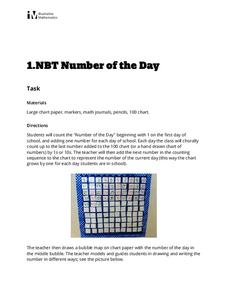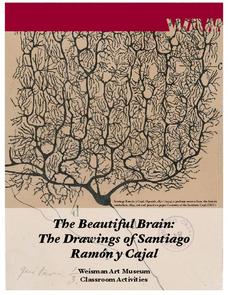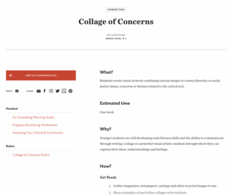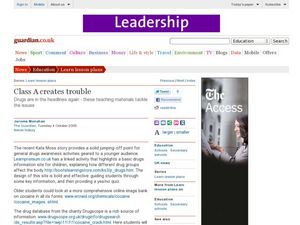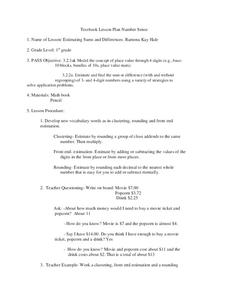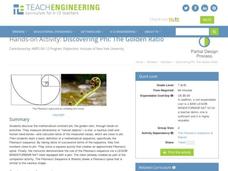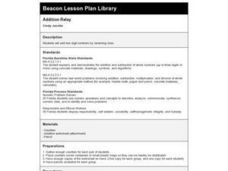DK Publishing
Money Word Problems #2
Are you experiencing money problems? Here are some more! Young mathematicians practice their addition and subtraction skills with money values in these word problems and number sentences. Some of the 25 questions prompt scholars to...
Illustrative Mathematics
Number of the Day
Daily routines not only help to manage classrooms, they can also provide learners with rich opportunities for learning. This activity supports young learners in developing their number sense by counting up the school days on a class...
K5 Learning
The Blind Men and the Elephant
Sometimes it's necessary to view the whole picture before making a judgment about a small part. Read a short story about five blind men who try to identify an elephant by feeling different parts and coming to their own conclusions....
Will Stegar Foundation
Citizen Climate
Many of the leading scientists in the world are studying climate change, and your learners can join in the discussion with a unit from the Will Steger Foundation. High schoolers work on eight lessons that focus on different aspect...
Read Works
The United States Constitution
The US Constitution is the beginning of Americans' rights. Use a five-paragraph passage to give a brief history of the US Constitution. A great last minute addition to a lesson on Constitution Day.
Intel
Cell-to-Cell
The third in a series of 10 STEM project-based lessons focuses on cells types, functions, and physiology. Through research, discussions, writings, and presentations, groups learn about the difference between plant and animal cells, the...
University of Minnesota
Beautiful Brain: Strangest Dream
Do words change or add meaning or interest to a work of art? The final lesson plan in a four-part series on the beautiful brain as a work of art focuses on art analysis. Scholars write a story about exploring art from the inside....
Teaching Tolerance
Collage of Concerns
A picture can speak louder than words. An interesting lesson introduces the themes of social justice and diversity to young learners by having them create artwork. Scholars create collages from a variety of sources to showcase what...
Curated OER
Surprise Object
For this addition practice worksheet, learners solve 12 problems that require them to add using 2 and 3-digit numbers. Students use their answer to reveal a mystery word and respond to a questions regarding grouping.
Curated OER
Finding Averages
In this averages and mean worksheet, 4th graders find the average and/or mean of 5 groups of numbers and place their answers on the lines provided.
Alabama Learning Exchange
Pizza! Pizza! Pizza!
Fifth graders practice using money in everyday situations. They use their addition and subtraction skills as they work in cooperative groups to solve problems involving decimals.
Curated OER
Bicycle Ride
Second graders observe and demonstrate how to add and subtract three-digit numbers as they relate to word problems. They discuss an annual bike ride in Iowa, and solve problems on an activity sheet along with the teacher. Students draw a...
Curated OER
Life Cycles
Using computers, Students work in small groups and progress through the roles of Explorer, Researcher, Designer, and Evaluator as they study the life cycle of plants, insects, butterflies and frogs.
Curated OER
Adding "Homeside" to "Schoolside" Learning
Students participate in activities in order to improve their ability to work cooperatively in groups at school as well as with their family at home. They complete the activities at home with their family then discuss the results of the...
Curated OER
Class A Creates Trouble
Students explore the history of drugs and drug use. In this anti-drug lesson plan, students research information about drugs, then enhance their knowledge by digging into the subject even farther by researching the health...
Curated OER
Number Sense
First graders practice rounding 4 digit numbers using place value concepts. In this estimating sums and differences lesson, 1st graders explore clustering, rounding, and front end estimation as methods for rounding decimals.
Pennsylvania Department of Education
Use Order of Operations to Evaluate Expressions—No Grouping Symbols
Students identify and explain different types of data collection and graphs. In this graphs and data collection lesson, students record their observations of a variety of data collection tools and graphs displayed in the room. Students...
Curated OER
"How Many Names for 100?"
Fifth graders work on the different possibilities of reaching the number 100. The class is divided into homogeneous groups for cooperative learning. The activity uses discussion questions to help with problem solving.
Teach Engineering
Discovering Phi: The Golden Ratio
Fe, phi, fo, fum. This activity leads pairs to find the ratio of consecutive terms of the Fibonacci sequence. The pairs find that the Fibonacci sequence can be found in many places. A discussion with the class shows that the ratios...
Multieducator
Constitution and Federalist Papers
This reference app provides full text of the Constitution, including the amendments, as well as Madison's Journals, the Federalist Papers, Virginia Convention documents, and more. It also includes notes that provide additional...
Curated OER
Addition and Subtraction of Signed Numbers
Students explore the concept of adding and subtracting using positive and negative numbers. In this addition and subtraction of signed numbers lesson, students use pennies to represent positive and negative numbers. Students deposit and...
Curated OER
Modeling Addition: Commutative Property and Zero Property
First graders practice modeling addition. In this hands-on addition lesson plan, 1st graders are introduced to the Commutative Property of Addition and the Zero Property of Addition through modeling and the use of manipulatives. This...
Curated OER
Using 10 to Add 7, 8, and 9
In this using ten to add to seven, eight and nine worksheet, students, working with a partner, practice adding various numbers to the number ten for mastery.
Curated OER
Addition Relay
Third graders, in pairs, use a bag of counters which can be dried beans, squares of papers, etc.



